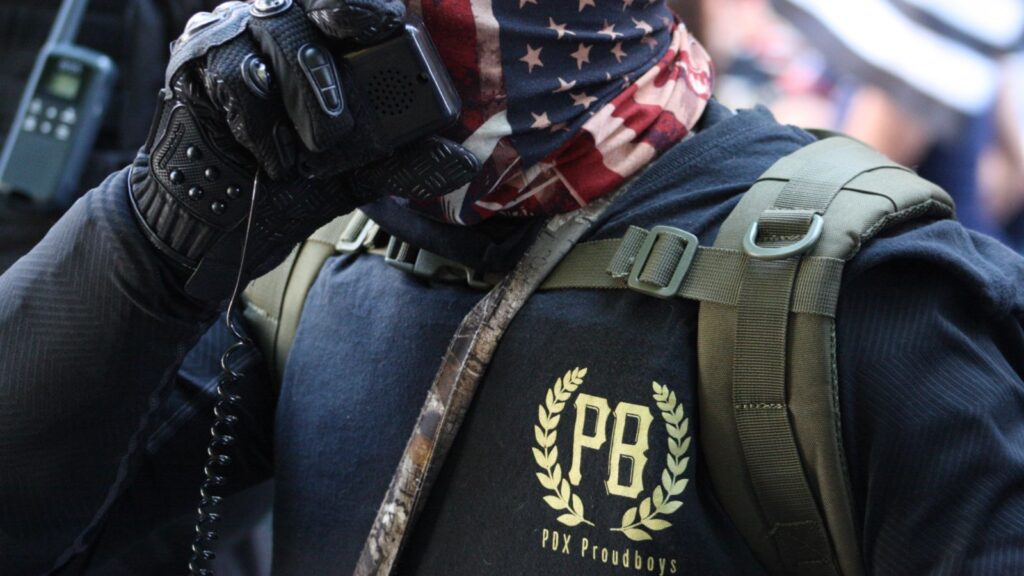Understanding and recognising the warning signs of fascism in someone is crucial. Fascism is a dangerous ideology that can lead to the erosion of democratic values, human rights, and social justice. Here are 21 key indicators to look out for that someone might be a fascist.
Extreme Nationalism

According to Britannica, “Fascist ideologues taught that national identity was the foundation of individual identity,” and this often goes beyond simple pride in one’s country. It morphs into a belief that their nation is superior to all others. They may constantly promote the idea that their country should dominate others and dismiss or attack anything perceived as unpatriotic.
Obsession with National Security

A person who may have fascist tendencies often displays an obsession with national security. They may support extensive surveillance, strict immigration controls, and harsh penalties for perceived threats. This obsession can lead them to justify human rights abuses and the curtailing of freedoms in the name of protecting the nation.
Disdain for Human Rights

Someone leaning towards fascism often shows a blatant disregard for human rights, arguing that to maintain security and order, it’s acceptable to limit freedom of speech, assembly, or even the right to a fair trial. Such disdain can manifest in support for policies that target specific groups or justify torture and other extreme measures.
Scapegoating

Fascists typically blame society’s problems on a specific group of people. Such scapegoating is used to create an ‘us versus them’ mentality. They might target immigrants, ethnic minorities, religious groups, or political opponents, claiming these groups are the root of all issues and must be dealt with harshly.
Rampant Sexism

Extreme sexism is another hallmark of fascism because a person with fascist views often believes in rigid gender roles and the inherent superiority of men over women. Opposing feminism, dismissing women’s rights issues, and promoting policies that restrict women’s freedoms and opportunities are all signs to look out for.
Control of Media

A fascination with controlling the media is a red flag, too. This person might support censorship, attack independent journalism, and spread misinformation to manipulate public opinion. They often promote the idea that only certain media outlets can be trusted, usually those that align with their views.
Obsession with Crime and Punishment

Fascists tend to have an exaggerated focus on crime and harsh punishments, often advocating for extreme measures like the death penalty for minor offences or endorsing brutal law enforcement tactics. This obsession is often used to justify authoritarian control and the erosion of civil liberties.
Suppression of Labour Unions

Fascists often target labour unions because they represent collective power and opposition to authoritarian rule. So, a person with fascist tendencies may support laws that weaken unions and promote anti-union propaganda. An obvious warning sign is if they endorse violent crackdowns on union activities.
Disdain for Intellectuals and the Arts

A strong disdain for intellectuals and the arts is common. People might mock or discredit intellectuals, scientists, and artists, viewing them as threats to their ideology. Such disdain often results in the promotion of anti-intellectualism and the suppression of free thought and creativity.
Obsession with Tradition

Another indicator is an intense obsession with tradition and the past. The person might romanticise a “golden age” and push for a return to traditional values, often at the expense of progress and modernity. Rigid views on family structure, gender roles, and societal norms are things to look out for.
Powerful and Continuing National Pride

National pride is taken to an extreme level, where the nation’s greatness is constantly emphasised. Someone who believes their country is infallible and resists any criticism or efforts to change may be a fascist. This excessive pride often leads to xenophobia and an exclusionary attitude towards others.
Hostility to Modernity

A red flag is when someone shows significant hostility to modernity and progressive values. They may resist changes that promote equality, environmental sustainability, and technological advancements, viewing them as threats to their traditional way of life. This resistance can manifest in the rejection of new ideas and innovations.
Authoritarian Leadership

There might also be a preference for strong, authoritarian leadership, which is a major sign—they often idolise leaders who exhibit total control, disregard democratic processes, and make unilateral decisions. Admiration for authoritarian figures reflects a desire for order and control over individual freedoms.
Cult of Personality

Fascists often cultivate a cult of personality around their leaders. This means they idolise and unquestioningly follow a leader, treating them as infallible and above reproach. Blind allegiance such as this often leads to the erosion of democratic norms and the centralisation of power.
Use of Propaganda

It is also common for extremists to use propaganda to spread their ideology. They might disseminate biased information, use emotional manipulation, and create false narratives to influence public opinion. Propaganda is a powerful tool for rallying support and marginalising any opposition.
Militarism

A glorification of the military and a desire for a strong, aggressive defence policy is typical of a fascist, too. Pushing for increased military spending, celebrating military conquests, and advocating for a society structured around military values and discipline are all clear signs.
Anti-Democratic Tendencies

Someone with fascist leanings often shows anti-democratic tendencies, where they may question the validity of elections, undermine democratic institutions, and support measures that concentrate power in the hands of a few. This disdain for democracy is a core component of fascist ideology.
Social Darwinism

Belief in Social Darwinism—the idea that certain groups are naturally superior and destined to dominate—is another warning sign. They may argue that the strong should lead and the weak should be left behind, promoting policies that favour the elite and ignore vulnerable populations.
Racism and Bigotry

It’s also no surprise that racism and bigotry are central to fascist beliefs, as these people will often promote the idea of racial purity, segregation, and discrimination against those who are different. This hatred can manifest in violent rhetoric, hate crimes, and support for racist policies.
Anti-Immigration

An intense anti-immigration stance is a common trait, too. Beliefs that immigrants are a threat to the nation’s identity, economy, and security often lead to support for strict immigration laws, border walls, and the deportation of immigrants.
Rejection of Diversity

One final warning sign to watch out for is whether they reject diversity in all its forms. Opposing multiculturalism, LGBTQ+ rights, and any form of social inclusion that celebrates differences are all red flags. This rejection is rooted in a desire for homogeneity and fear of the ‘other.’







